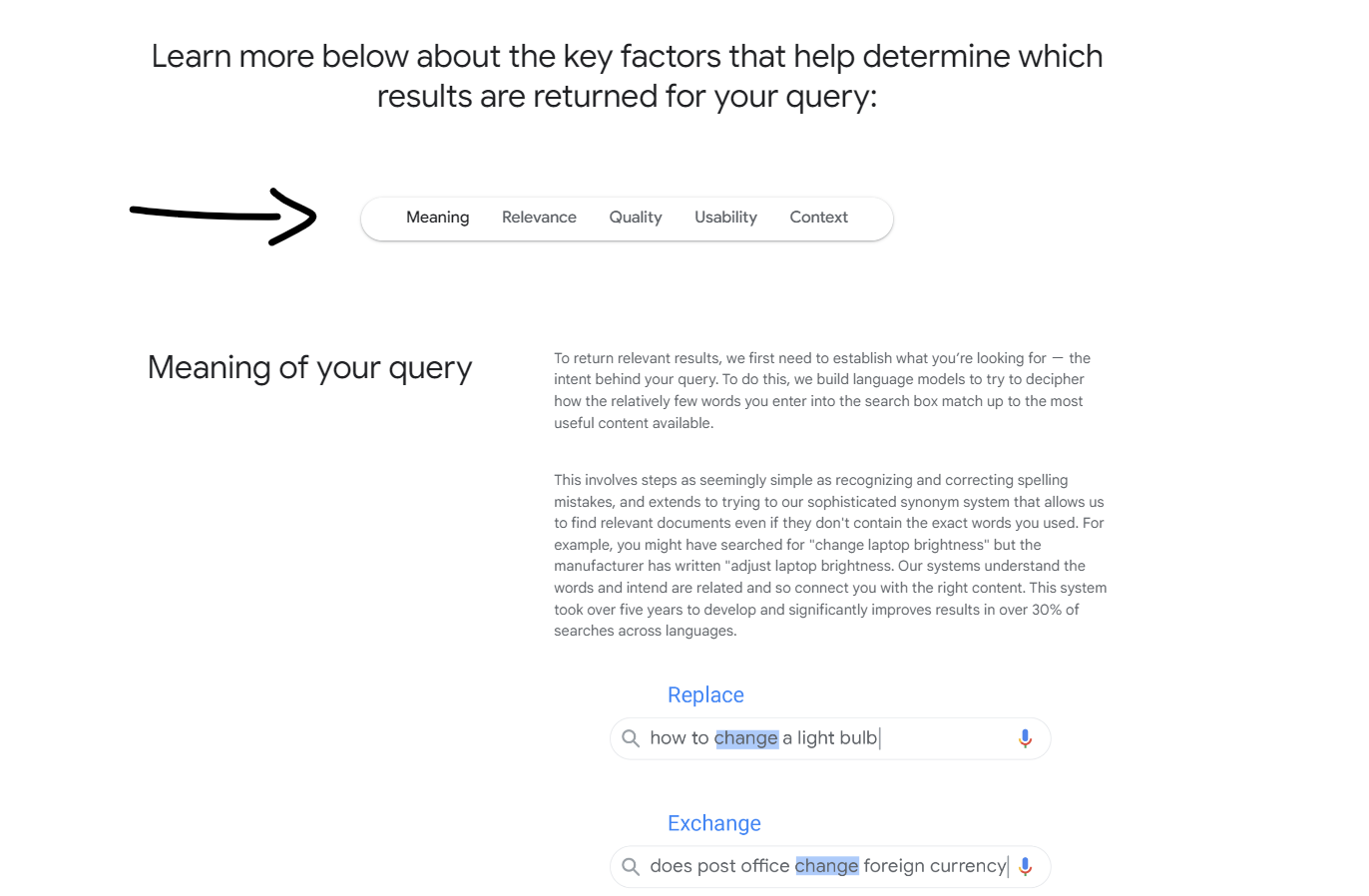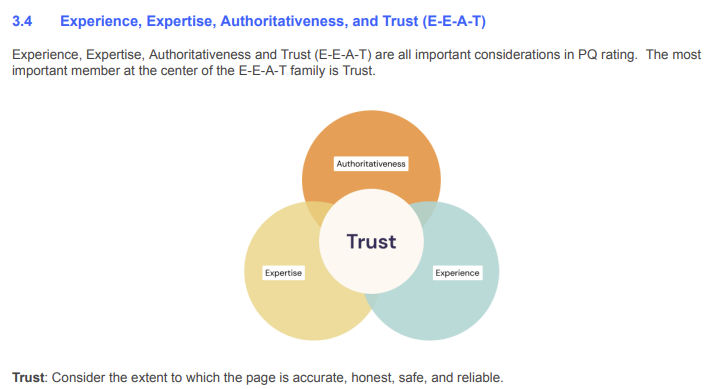Introduction
In the realm of SEO, Google’s EEAT (Expertise, Authoritativeness, and Trustworthiness) has emerged as a pivotal concept. It’s a framework that Google employs to assess the quality and relevance of web content. This article aims to provide a comprehensive understanding of EEAT, its components, and practical strategies to optimize websites and content to align with these criteria, thereby boosting SEO performance.
E-A-T: The Core Concept
The concept of E-A-T, which stands for Expertise, Authoritativeness, and Trustworthiness, is a fundamental framework used by Google to evaluate the quality of content on the web. This framework is especially crucial in determining the credibility and value of a website or a piece of content in the eyes of both users and the search engine. Here’s a more detailed look at each component of E-E-A-T:
1) Expertise
Expertise is the first component of the E-A-T framework and is critical in establishing the credibility of content, particularly in specialized or technical fields.
- Definition: Expertise refers to the depth and breadth of knowledge that the content creator possesses in a specific field or subject. It’s not just about having surface-level information but rather a deep and comprehensive understanding of the topic.
- Demonstration of Expertise: Expertise can be demonstrated through the author’s qualifications, experience, and the depth of the content provided. For instance, a health article written by a medical professional is more likely to be viewed as expert content compared to the same article written by a layperson.
- Importance: Expertise is crucial because it ensures that the information presented is accurate, detailed, and useful to the reader. In fields like healthcare, finance, or legal matters, where incorrect information can have serious consequences, expertise becomes even more vital.
2) Authoritativeness
Authoritativeness takes expertise a step further. It’s about how the content, as well as the content creator or website, is viewed by others in the same field.
- Definition: Authoritativeness is the recognition and respect that a content creator or website receives from other experts and sources within the same field. It’s about being considered a go-to authority on a subject.
- Building Authority: This can be achieved through various means such as peer recognition, citations from other authoritative sources, and positive reviews or testimonials. For example, a tech blog cited by major technology news outlets gains authority in the tech field.
- Impact on SEO: Authoritative content is more likely to be referenced by others, leading to a higher number of inbound links, which are critical for SEO. Google uses such signals to rank content in search results.
3) Trustworthiness
The final component of E-E-A-T is Trustworthiness. This aspect of the framework focuses on the integrity and reliability of the content and its creator.
- Definition: Trustworthiness is about the accuracy, honesty, and transparency of the information presented. It involves not just factual correctness but also an honest representation of the content and the content creator.
- Establishing Trust: Trust can be established by citing reliable sources, providing evidence for claims made, and avoiding misleading or deceptive information. For example, a news article that accurately reports events and cites credible sources is considered trustworthy.
- Relevance to Users: Users are more likely to return to and recommend sites that they find trustworthy. Trustworthiness also impacts user engagement and the overall reputation of the website or author, which in turn affects SEO rankings.
4) Experience (Updated)
The link provided leads to Google’s Search Central Blog, which details an update to the quality rater guidelines, specifically focusing on the E-A-T (Expertise, Authoritativeness, and Trustworthiness) framework. In this update, an extra ‘E’ for Experience has been added, indicating a shift or enhancement in the guidelines to include this new element. Unfortunately, without more information from the content of the page itself, it’s not possible to provide a more detailed summary of the changes or their implications for SEO and content creators.

The Importance of EEAT in SEO
EEAT plays a crucial role in SEO as it directly impacts how Google ranks pages. Google aims to provide users with the most relevant and high-quality search results. Pages that exhibit high levels of expertise, authoritativeness, and trustworthiness are more likely to rank higher in search results. This is particularly true for YMYL (Your Money Your Life) pages, which include topics like health, finance, and safety, where inaccurate information can significantly impact users’ well-being.
How to Improve Expertise Signals
Demonstrating expertise in your content is essential. This involves not only having in-depth knowledge of your subject but also the ability to communicate it effectively to your audience. For instance, a medical website should have content written or reviewed by medical professionals to ensure accuracy and depth.
- How to Demonstrate Expertise: Share your qualifications, experience, and any recognition you have received in your field. Use detailed, well-researched content that reflects your knowledge.
- Examples: A finance blog could feature articles written by certified financial advisors, or a cooking website might showcase recipes created by professional chefs.
How to Improve Authoritativeness Signals
Building authoritativeness is about establishing yourself or your website as a go-to source in your niche. It involves not just what you know, but how others perceive your knowledge and trust your content.
- Establishing Authority: Gain recognition from other reputable figures or websites in your field. This can be achieved through guest blogging, interviews, collaborations, or getting cited as a source by other authoritative sites.
- Case Studies: For instance, a tech blogger might gain authority by being featured in well-known tech publications or by speaking at industry conferences.
How to Build Trustworthiness Signals
Trustworthiness is about ensuring that your audience can rely on the accuracy and honesty of your content. This includes having a transparent website with clear contact information, privacy policy, and terms of service.
- Techniques to Enhance Trust: Regularly update content to ensure its accuracy, disclose any affiliations or sponsorships, and engage honestly with your audience through comments and social media.
- Real-World Applications: An e-commerce site can enhance trust by displaying customer reviews, providing clear return policies, and ensuring secure payment methods.
EEAT in Different Industries
The application of Google’s EEAT (Expertise, Authoritativeness, and Trustworthiness) principles can vary significantly across different industries. This variation is due to the unique characteristics and requirements of each industry, particularly in terms of what is considered expert knowledge, authoritative sources, and trust-building mechanisms. Here’s a detailed look at how EEAT applies in different sectors:
- Health Care: Requires content written or reviewed by medical professionals.
- Finance: Prioritizes advice from certified financial experts.
- E-Commerce: Focuses on user trust through customer reviews, secure transactions, and clear product information.
The application of Google’s EEAT (Expertise, Authoritativeness, and Trustworthiness) principles can vary significantly across different industries. This variation is due to the unique characteristics and requirements of each industry, particularly in terms of what is considered expert knowledge, authoritative sources, and trust-building mechanisms. Here’s a detailed look at how EEAT applies in different sectors:
1) Health Care
In the healthcare industry, the stakes for accuracy and reliability of information are exceptionally high due to the potential impact on individuals’ health and well-being.
- Expertise: In this industry, content needs to be created, reviewed, or endorsed by medical professionals with relevant qualifications and experience. For instance, a blog post about heart health should ideally be written or reviewed by a cardiologist.
- Authoritativeness: The authority in healthcare content is often determined by the credentials of the contributors, endorsements from recognized medical institutions, and citations in reputable medical journals or publications.
- Trustworthiness: Trust is built through the accuracy of the information, the transparency about the source of the content, and the presence of evidence-based research or data. Misinformation or unverified claims can have serious consequences, making trustworthiness crucial.
2) Finance
The finance industry deals with sensitive information related to personal and corporate finance, investments, and economic theories, where misinformation can lead to substantial financial losses.
- Expertise: Financial advice or content should ideally come from certified financial experts, such as Certified Financial Planners or individuals with a strong background in finance or economics.
- Authoritativeness: Authority in finance content is often linked to recognition by prominent financial institutions, endorsements from well-known financial experts, or publication in esteemed financial media.
- Trustworthiness: In finance, trust is built by providing accurate, transparent, and up-to-date financial advice. Compliance with legal and ethical standards, especially in investment advice, is also a key factor in establishing trust.
3) E-Commerce
E-commerce revolves around online shopping and transactions, where trust is a crucial factor in consumer decision-making.
- Expertise: While traditional expertise as seen in health or finance is less critical here, knowledge about products, market trends, and consumer needs is vital. This includes detailed product descriptions, knowledge about the usability and benefits of products, and insights into consumer preferences.
- Authoritativeness: In e-commerce, authority is often built through brand reputation, customer testimonials, and endorsements from influencers or industry experts. High-quality content that showcases product expertise can also build authority.
- Trustworthiness: Trust in e-commerce is heavily reliant on user experience. This includes secure transactions, clear and honest product information, easy return policies, and positive customer reviews. Transparency in pricing and the availability of customer support also play a significant role in building trust.

Content Creation and EEAT
Content creators must be aware of EEAT to produce SEO-friendly content. This involves thorough research, writing in an engaging and understandable manner, and citing reputable sources.
- Strategies for Content Writers: Focus on creating informative, well-researched content. Use a tone that resonates with your audience and adds value to their experience.
- Tools and Resources: Utilize SEO tools to research keywords, understand audience intent, and keep track of content performance.
EEAT and Website Design
Website design can significantly influence perceptions of EEAT. A well-designed, user-friendly website can enhance the perceived expertise, authority, and trustworthiness.
- Design Elements That Influence EEAT: Ensure your website is easy to navigate, has a professional design, and is accessible on various devices. Include clear about us, contact, and author biography pages.
EEAT and Social Media Presence
Social media platforms offer a unique opportunity to enhance EEAT. They allow for direct engagement with your audience and can help in establishing authority and trust.
- Leveraging Social Platforms: Share valuable content, engage with your audience, and participate in relevant discussions. Use social proof, such as testimonials and user-generated content, to boost trustworthiness.
Handling Negative Content
Handling negative content is a critical aspect of maintaining and enhancing the trustworthiness component of Google’s EEAT (Expertise, Authoritativeness, and Trustworthiness) guidelines. Negative reviews, comments, or any form of adverse content can significantly impact a brand’s or individual’s reputation online. It’s crucial, therefore, to address such content in a manner that not only mitigates its impact but also reinforces trust among the audience.
Mitigating the impact of negative content involves a proactive and constructive approach. Firstly, it’s essential to respond to negative reviews or comments in a professional and empathetic manner. Acknowledging the issue, apologizing if necessary, and offering a solution or a way forward are key steps in this process. This approach demonstrates a commitment to customer satisfaction and shows that you value feedback, which can turn a negative experience into a positive one. Additionally, being open to feedback, even when it’s critical, and using it to improve services or products can significantly enhance trustworthiness. It’s important to remember that the way an organization handles criticism can often speak louder about its values and trustworthiness than the criticism itself.
- Mitigating Impact on EEAT: Respond to negative reviews or comments professionally and constructively. Offer solutions and be open to feedback.
EEAT and User Experience
EEAT (Expertise, Authoritativeness, and Trustworthiness) and user experience are intricately linked in the realm of SEO and web content. A positive user experience is essential in reinforcing the EEAT factors of a website. When users find a website easy to navigate, the content relevant and engaging, and the overall design appealing and accessible, it enhances their perception of the site’s expertise, authoritativeness, and trustworthiness. For example, a well-structured website with high-quality, informative content, clear headings, and an intuitive layout demonstrates expertise and authority in the subject matter. Moreover, features such as a clear privacy policy, secure browsing, and transparent contact information build trust. In essence, a superior user experience doesn’t just satisfy the immediate needs of users but also contributes significantly to the long-term credibility and reputation of the website, directly impacting its EEAT ratings in Google’s eyes. Therefore, optimizing the user experience is not just about technical and aesthetic aspects, but it’s also a strategic approach to enhance a website’s EEAT profile.
- Importance of User Engagement: Optimize website speed, ensure mobile-friendliness, and provide valuable content that encourages user interaction and sharing.
Monitoring and Improving EEAT
- Tools and Techniques: Utilize SEO tools, analytics platforms, and feedback mechanisms to gauge performance and identify areas for improvement.
Future of EEAT in SEO
The future of EEAT (Expertise, Authoritativeness, and Trustworthiness) in SEO is poised to become increasingly significant as search engines evolve to prioritize user experience and content quality. As Google’s algorithms become more sophisticated, they are expected to refine their ability to evaluate the EEAT of web content more accurately and comprehensively.
This shift will likely place a greater emphasis on authentic, well-researched, and user-focused content, pushing websites to prioritize not only the technical aspects of SEO but also the substantive value of their content. Moreover, with the growing importance of artificial intelligence and machine learning in search algorithms, the nuances of EEAT could be assessed more deeply, considering factors like context, user intent, and the evolving standards of different industries. As a result, content creators and website owners will need to be more vigilant and proactive in showcasing their expertise, building authority, and establishing trust.
This could lead to a more transparent and quality-driven web ecosystem, where the credibility and reliability of information become key determinants of SEO success. In this future landscape, mastering EEAT will be an essential strategy for achieving and sustaining high search engine rankings and online visibility.
EEAT FAQs
What is Google EEAT?
Google EEAT stands for Expertise, Authoritativeness, and Trustworthiness. It’s a framework used by Google to assess the quality of content on the web.
Why is EEAT important for SEO?
EEAT is important for SEO because it helps determine a webpage’s quality, directly influencing its search engine rankings.
How can a website improve its EEAT?
Improving EEAT involves enhancing the expertise, authoritativeness, and trustworthiness of the content through quality writing, reliable sources, and transparent practices.
Does EEAT vary across different industries?
Yes, EEAT criteria can vary depending on the industry, with different sectors having unique standards and expectations.
What is the future of EEAT in SEO?
The future of EEAT in SEO is expected to emphasize the importance of quality, authoritative, and trustworthy content even more, as Google continues to refine its algorithms to provide the best user experience.


